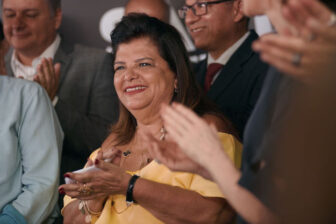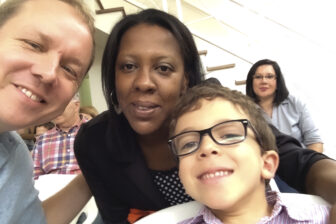This article is adapted from AQ’s special report on closing the gender gap | Leer en español | Ler em português
Diversity across gender, race, culture and ethnicity drives innovation and progress. That’s why organizations are increasingly focused on ways they can improve representation and inclusion. Many of these efforts have moved the needle toward a more equitable society. But obstacles remain.
As societies respond to COVID-19, women have found themselves disproportionately without work or the social protections provided by the formal sector. In the same way the pandemic has exacerbated existing inequalities, it has also forced us to address them. Right now, financial opportunities for women need to be a priority.
Entrepreneurship is a proven way of supporting women in vulnerable situations, giving them access to financial freedom and improving their families’ economic prospects. Women invest the majority of their earnings in their own communities at a higher rate than their male counterparts. They spend more of their income on their families’ health, education and general well-being, promoting future economic gains and inclusive growth. In turn, strengthening women’s economic buying power directly leads to stronger local economies.
The good news is that over the last several years, the number of women-owned small and medium enterprises (SMEs) has grown across the hemisphere. A 2015 study by the McKinsey Global Institute found that global GDP could increase by $28 trillion by 2025 if women were able to participate in the labor market at the same rate as men. While the gains since then have yet to be measured at a global scale, several markets in the region have made strides in terms of gender equity and entrepreneurship. Public data from the International Labor Organization and UNESCO show that women in Ecuador, Colombia and Brazil are nearly as likely to launch entrepreneurial ventures as men. Despite this, it is important that we look at what challenges — and possible solutions — lie ahead.
The shortfall
Latin America and the Caribbean have the highest number of self-employed women in the world. Yet only 30% of female-led SMEs that apply for a loan are approved, and often with very high collateral requirements and rates. According to a study by First Round Capital, women receive less than 3% of venture capital funding worldwide, with minority women even further behind. A study conducted in Chile by the Inter-American Development Bank found that men are more likely to receive loans than women, despite the information on their loan applications being the same. As the region continues to fight COVID-19 and entrepreneurs apply for loans to keep their businesses afloat, this type of bias can have severe implications for the future of gender equity in the region.
Women in the region often lack formal credit history, and having little to no access to collateral constrains their ability to apply for credit. Blanket and gender-neutral regulatory measures tend to widen the gap in outcomes, putting women in a more disadvantaged position than men in starting or managing businesses. For example, they may be less able than men to afford long and expensive registration procedures due to low wages and time demands.
According to the World Bank, the majority of female-led businesses are in the retail and service sectors, which are less profitable than other industries. Lower wages also make it difficult for banks to approve the loans required to jumpstart a business. As a result, women’s inability to get funding from traditional sources means they are more likely to tap into their savings and personal credit to fund their ventures or borrow money from family and friends to finance their startup. A study by INCAE Business School showed that while a majority of men said they closed their business due to low profitability, the majority of female entrepreneurs cited difficulty in obtaining financing as the downfall of their business. Even when women do seek business loans, they tend to receive less capital, pay higher interest rates, and put up more collateral than their male counterparts. The obstacles facing women entrepreneurs need to be addressed openly, alongside efforts to eliminate entrenched cultural barriers based on gender and societal norms.
What can be done
While women are involved in a range of entrepreneurial activities, many tend to be concentrated in micro, small and medium businesses because of lack of collateral and capital, limited access to technical assistance, and the absence of women leaders in decision-making positions. Opening a bank account is a key stepping-stone in accessing financial services, including credit that can lead to otherwise unattainable economic opportunities.
As an institutional bank operating in most of the region, Citi focuses on providing technical and advisory assistance, as well as lending support, to those providing services directly to SMEs. Together with the U.S. International Development Finance Corporation (IDFC, formerly OPIC), we’ve provided over $536 million in financing to 58 inclusive businesses in 27 countries, reaching over 1.4 million entrepreneurs, 87% of whom are women. In the Dominican Republic, Citi and the IDFC agreed to extend a mid-term loan to Banco Adopem de Ahorro y Crédito to support the growth of a portfolio benefiting 14,000 women-led enterprises. In Paraguay, the IDFC and Citi agreed on two loan facilities (one for $150 million to Banco Regional and another for $100 million to Banco Sudameris) for small and medium enterprises, with a focus on women-owned businesses. Increasing women’s capital and access to collateral is also tied to gender pay equity. That is why we committed to not only close the gap in pay between men and women at Citi, but also to make our pay gap public to ensure full accountability.
Citi has also made a global commitment together with IDFC and the Ford Foundation for a $100 million loan guarantee facility that will enable us to provide early-stage financing in local currency to companies that expand access to products and services for low-income communities in emerging markets. We have committed to actively seek out opportunities to invest in businesses that are led or owned by women and minority entrepreneurs.
However, focusing on credit alone is not enough. A key factor in leveling the playing field is making sure we open channels to another variable in the success of entrepreneurial ventures: access to networks.
As a global bank, we have seen firsthand how crucial and effective these networks can be. Women-led SMEs are a major component of global supply chains. Companies in a position to play a part in network production can serve as a resource to the SMEs in their supply chain as part of their duty as corporate citizens, from financing to inventory management. Citi is committed to procurement from women-owned businesses, especially from firms located in developing markets. In 2019, we worked with partner organizations to identify businesses around the world that have registered as women-owned to evaluate their capabilities.
Building networks also means taking an internal look at organizational structures. Increasing the number of women in top management positions within the banking sector can provide diverse perspectives on reform, and help educate on biases and reduce them. The challenges women face in accessing finance and decision-making must be addressed in financial-sector reforms. Here, representation goals are important, particularly in senior management positions, which is why we made a public commitment to increase our representation of female senior leadership to 40% by 2021. The announcement of Jane Fraser, currently Citi’s president and CEO of global consumer banking, to succeed as CEO in February, is an important milestone in continuing to break barriers.
The current state of the world provides an opportunity to implement overdue changes. It is evident that the growth of female entrepreneurship is beneficial to all. Nevertheless, to truly unleash its potential we must first identify and recognize the obstacles that many women still face. As the global economy becomes increasingly diversified, we must be relentless in driving change that enables women to navigate financial markets, connecting the dots between financial capabilities, access to capital and their rightful role in the global economy.
—
Torres Cantú is CEO of Citi Latin America, responsible for all businesses in the 22 countries where Citi is present in the region. Cantú is a member of Citi’s Executive Management Team. Prior to his current role, he served as CEO of Citibanamex from 2014 to 2019.








